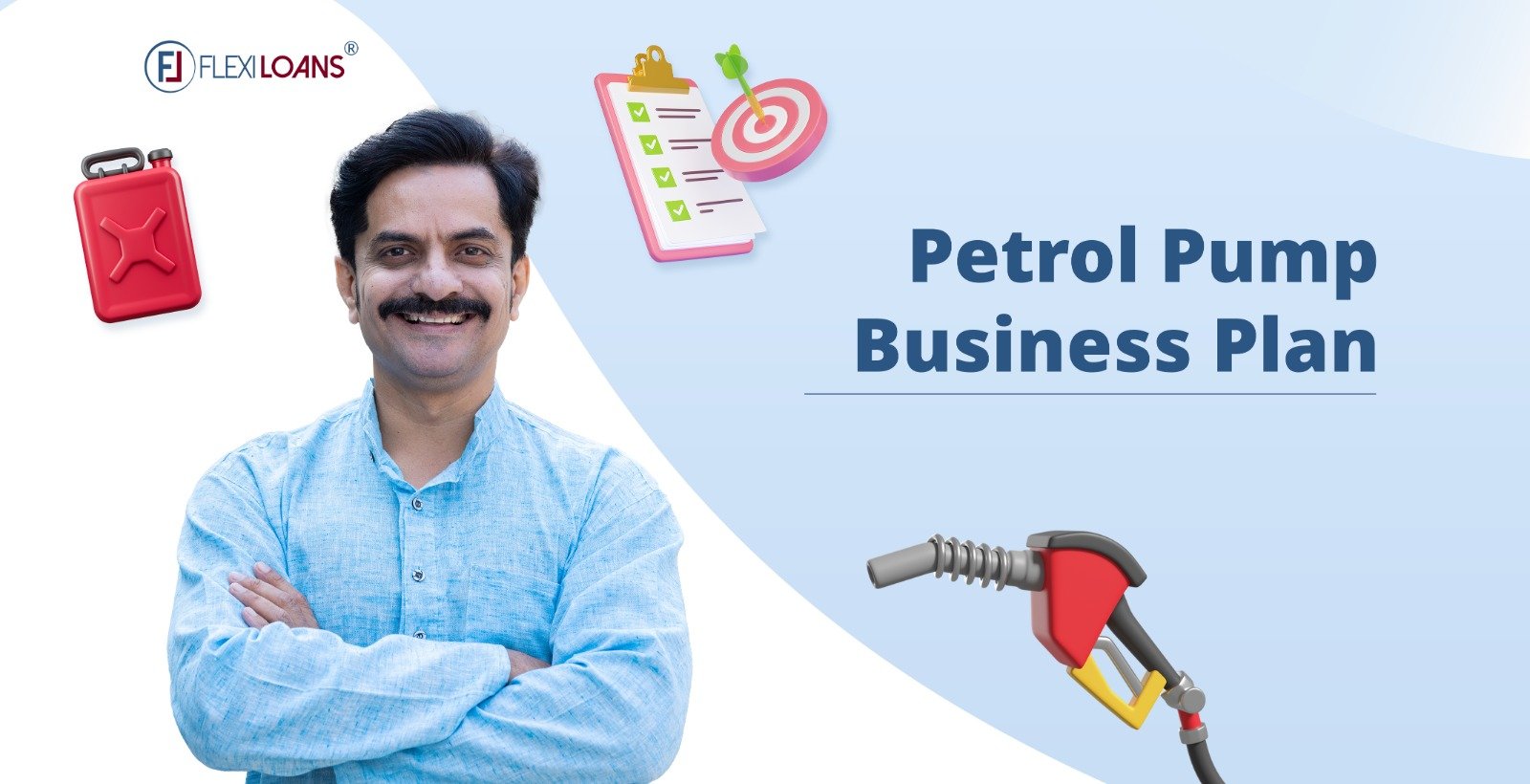Nov 09, 2023

The petrol pump industry presents a lucrative opportunity within the energy sector. However, establishing a petrol pump business necessitates meticulous planning, substantial investment, and strict compliance with regulatory protocols.
In this all-inclusive guide, we will guide you through the intricacies of launching and operating a prosperous petrol pump enterprise, encompassing critical facets such as expenses, permits, financial backing, and more.
Why Invest in a Petrol Pump Business?
Investing in a petrol pump business is a strategic and potentially lucrative venture for those looking to enter the energy sector. The demand for fuel remains steadfast globally, making the petrol pump industry a resilient and profitable one.
1. Steady Demand for Fuel
One of the primary reasons to consider investing in a petrol pump business is the constant and robust demand for fuel. Vehicles, whether they run on gasoline (petrol) or diesel, continue to be the primary mode of transportation for millions worldwide. As a result, the need for petrol pumps remains evergreen, making it a recession-resistant industry.
2. Profitable Margins
Petrol pump businesses typically offer reasonable profit margins. While the margins may vary due to factors like location, competition, and pricing strategies, petrol pump owners can often maintain a steady income stream. The ability to set competitive fuel prices, coupled with additional revenue streams like convenience stores or car washes, further enhances profitability.
3. Versatile Business Model
Investors in the petrol pump business can choose from various business models. You can either open an independent petrol pump or opt for a franchise arrangement with an established oil company like Indian Oil, Bharat Petroleum, or Hindustan Petroleum. Each model has its unique advantages, allowing you to tailor your investment to your preferences and resources.
4. High Initial Investment
While the potential returns in the petrol pump business are substantial, it’s essential to acknowledge the high initial investment required. Opening a petrol pump involves expenses such as land acquisition or lease, construction, machinery, working capital, and regulatory compliance. This is where business financing comes into play.
5. Financing Options
To cover the substantial costs associated with opening a petrol pump, entrepreneurs have access to several financing options:
Business Loans: Banks and financial institutions offer business loan tailored to the needs of petrol pump owners. These loans can help cover expenses like land acquisition, construction, and equipment purchases.
Working Capital Loans: Operating a petrol pump requires working capital to manage day-to-day expenses such as fuel purchases, staff salaries, and maintenance. Working capital loans provide the necessary funds to keep your business running smoothly.
Business Loans Without Collateral: Traditional business loans often require collateral. However, many financial institutions now offer collateral-free business loans, which can be beneficial for those who may not have significant assets to pledge.
Line of Credit: A line of credit offers flexibility by allowing you to borrow funds as needed, up to a predetermined limit. It’s a valuable resource for managing fluctuations in working capital and unexpected expenses.
6. Interest Rates for Business Loans
When considering financing for your petrol pump investment, it’s essential to assess the interest rates associated with business loans. Interest rates can significantly impact the overall cost of borrowing and your ability to generate a profit. The interest rate for a business loan may vary depending on the lender, your creditworthiness, and the prevailing market conditions.
7. Assessing Eligibility for Business Loan
Before applying for a business loan, it’s crucial to understand the eligibility criteria set by the lender. Lenders typically consider factors such as your credit score, business plan, financial stability, and collateral (if required). Meeting these criteria can enhance your chances of securing a loan with favourable terms.
8. Machinery Loan
A machinery loan is designed to help you finance the purchase of essential equipment for your petrol pump. This type of loan can cover the costs associated with fuel dispensers, storage tanks, and other machinery required for your business’s operation. By securing a machinery loan, you can reduce the initial financial burden and manage your cash flow more efficiently.
9. Quick Business Loans
Applying for business loans online can be a convenient and swift process. Online business loan applications allow you to submit your documents and receive approvals faster, ensuring that you can kickstart your petrol pump business sooner.
Now that we understand the basics, let’s delve into the specifics of starting and running a petrol pump business.
Market Research and Location Selection
Identifying a Suitable Location
The location of your petrol pump is a critical factor in determining its success. Consider the following when selecting a location:
High Traffic Area: Choose a spot with significant vehicle traffic, preferably on a busy road or near highways.
Accessibility: Ensure easy access for vehicles entering and exiting the station.
Proximity to Residential Areas: Being close to residential areas can attract regular customers.
Competitor Analysis: Research nearby petrol pumps and their pricing strategies.
Analyzing Competitors: Study the competition in your chosen area to understand their strengths and weaknesses. This analysis can help you differentiate your petrol pump and develop a competitive advantage.
Demographics and Customer Base
Consider the demographics of the area, including income levels, vehicle ownership rates, and commuting patterns. Understanding your potential customer base will help you tailor your offerings and marketing strategies accordingly.
Legal Requirements and Licensing
Obtaining the Necessary Licenses
Running a petrol pump business requires several licenses and permits, including:
Petroleum Storage License: Obtained from the Petroleum and Explosives Safety Organization (PESO).
Trade License: Issued by the local municipal authority.
Environmental Clearances: Ensure compliance with environmental regulations and obtain necessary clearances.
Fire Safety Certificate: Comply with fire safety standards and obtain a certificate.
Consult with legal experts or regulatory authorities to have an estimate for petrol pump license cost and to ensure you have all the required permits in place before opening your petrol pump business.
Cost Analysis
Petrol Pump Opening Cost
The cost of opening a petrol pump can vary significantly based on location, infrastructure, and other factors. Generally, you will need to budget for the following:
Land Acquisition or Lease: The cost of acquiring land or leasing it for your petrol pump station.
Construction and Infrastructure: Building the station, including fuel storage tanks, dispensers, and convenience store (if applicable).
Machinery and Equipment: Purchase of fuel dispensing equipment, pumps, tanks, and safety measures. You can easily apply and avail of a machinery loan from FlexiLoans.
Working Capital: Funds required for day-to-day operations, including fuel purchases.
Reserve Fund: A contingency fund for unexpected expenses or emergencies.
Financing Your Petrol Pump Business
Business Loans and Financing Options
Financing your petrol pump business can be achieved through various means:
Business Loans: Banks and financial institutions offer business loans tailored to the needs of petrol pump owners. FlexiLoans offers business loans online.
Government Schemes: Explore government schemes and subsidies that support entrepreneurs in the fuel retail sector. FlexiLoans offers business loans for women at attractive interest rates.
Loan Application Process: Understand the application process, eligibility criteria, and documentation required for business loans. Check the estimated business loan interest amount with the business loan EMI calculator.
Business Plan and Structure
Creating a Comprehensive Business Plan
A well-structured business plan is essential for securing financing and guiding your business. Key components of your business plan include:
Executive Summary: A concise overview of your business and its goals.
Market Analysis: Detailed research on the fuel market and your competitors.
Financial Projections: Projections of income, expenses, and profitability.
Marketing Strategy: Plans for branding, advertising, and customer acquisition.
Operational Details: Information on staffing, inventory management, and daily operations.
Fuel Supply and Dealership
Securing a Fuel Supply
Establish a reliable source of fuel supply, often through tie-ups with oil companies like Indian Oil, Bharat Petroleum, or Hindustan Petroleum. This ensures a steady and quality fuel supply for your station.
Petrol Pump Dealership Cost
The cost of securing a dealership from an oil company varies and can include security deposits and infrastructure requirements. Carefully review the terms and conditions before agreeing.
Franchise vs. Independent Operation
You can choose to operate as an independent petrol pump or opt for a petrol pump franchise arrangement with an oil company. Each option has its benefits and drawbacks, so consider your business goals and resources when making this decision.
Infrastructure and Machinery
Building a Modern Petrol Pump Station
Invest in modern and aesthetically pleasing infrastructure to attract customers. The layout should be well-organized for smooth vehicle flow and customer convenience.
Machinery and Equipment Required
Essential equipment for a petrol pump includes fuel dispensers, underground storage tanks, safety measures, and electronic systems for billing and inventory management. FlexiLoan offers a machinery loan at reasonable interest rates.
Maintenance and Safety Measures
Regular maintenance of equipment and safety protocols is crucial to ensure smooth operations and minimize risks associated with fuel handling.
Marketing and Promotion
Branding and Signage
Create an appealing brand identity with eye-catching signage. Your branding should reflect trustworthiness and safety, as customers prioritize these factors when choosing a petrol pump.
Advertising Strategies
Utilize various marketing channels such as social media, local advertising, and loyalty programs to attract and retain customers. Highlight any unique offerings, such as a car wash or convenience store.
Operational Considerations
Staffing and Training
Hire and train staff who are knowledgeable about fuel dispensing, safety procedures, and customer service. Friendly and efficient service can build customer loyalty.
Inventory Management
Implement robust inventory management systems to monitor fuel levels and restock efficiently. Prevent fuel shortages to maintain customer satisfaction. You can always avail working capital loan from FlexiLoans.
Accounting and Record-keeping
Maintain accurate financial records, including sales, expenses, and taxes. Consider using accounting software to streamline your financial processes.
Financial Projections
Estimating Income and Expenses
Develop realistic financial projections that take into account your income from fuel sales, convenience store (if applicable), and other revenue streams, as well as operating expenses such as staff salaries, maintenance, and utilities.
Projected Profit Margin
Calculate your projected profit margin based on your business plan and financial projections. This will help you set pricing strategies and assess the profitability of your petrol pump.
Break-Even Analysis
Determine the point at which your petrol pump business will break even, covering all initial investments. This is a crucial milestone in your financial planning.
Risk Management and Insurance
Identifying Potential Risks
Assess potential risks in the petrol pump business, including fire hazards, fuel theft, environmental liabilities, and accidents.
Choosing the Right Insurance Policies
Consult with insurance experts to select appropriate insurance coverage, including general liability, property insurance, and environmental pollution coverage.
Environmental Responsibility
Sustainable Practices
Implement environmentally responsible practices such as proper waste disposal, fuel spill prevention, and energy-efficient equipment.
Pollution Control Measures
Adhere to pollution control regulations and regularly inspect your petrol pump for compliance. Report any leaks or spills promptly.
Conclusion
To establish a petrol pump business, you need to consider several factors, including the associated opening costs and crafting a robust business plan. MSME loan without collateral and small business loan can provide financial support for entrepreneurs.
FAQs
Q1. How do I obtain a license for a petrol station?
Ans: State authorities may obtain a license to own and operate a petrol station depending on the location of the station, with permission from the state’s municipal corporation department, NOCs, and a copy of the location’s certificate.
Q2. What is the bare minimum needed to launch a petrol pump business?
Ans: According to the location of the retail outlet, a petrol pump startup requires a minimum investment of Rs. 15 lakh and a maximum investment that may exceed Rs. 35 lakh.
Q3. What is the commission for petrol station dealers?
Ans: The commission for petrol station dealerships varies depending on the agency and the location. However, the general commission varies from Rs. 2 to Rs. 5 per liter, and tax, commission, and duty account for nearly half of the cost of petrol per liter.







